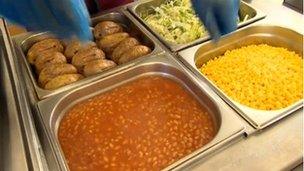EIS union in 'free school meals for all infants' call
- Published

The EIS argues free meals would help improve children's health and their performance at school
Scotland's largest teachers' union has called on the Scottish government to fund free school meals for all infants.
The EIS said giving free school dinners to all children in primaries 1, 2 and 3 could help tackle poverty and inequality.
In England, all infants will be entitled to free school meals from next autumn.
Scottish ministers are expected to make a decision over the issue in the New Year.
The Scottish government receives cash which could pay for extending free meals through the Barnett Formula - the formula which dictates how much money Holyrood has to spend.
However it argues the extra cash it will receive because of the changes to school dinner funding in England will in no way compensate for cuts elsewhere.
The EIS argues free meals for children in primaries 1, 2 and 3 would help family budgets and improve children's health and performance at school.
The union is a signatory to a recent letter from the Child Poverty Action Group to the government which calls for a firm commitment from the Scottish government to do this.
'Significant step'
General secretary Larry Flanagan said: "Ensuring that all pupils in P1 to P3 receive a free school meal would be a significant step, which would aid family budgets, bring important health benefits for young children and help these pupils concentrate on their learning throughout the school day."
The government said there had been a rise in the number of children receiving free school meals in recent years and is expected to reach a decision on whether to extend entitlement in the New Year.
A Scottish government spokesman said: "The number of eligible children registered for free school meals has increased by 19,000 since 2007.
"We are committed to expanding free school meal provision further but have been focusing on maintaining eligibility to free school meals under the UK government's programme for welfare reform."
'Careful consideration'
He added: "Recently we were informed of the Barnett consequential arising from the UK government's statement.
"As the funding will form part of the Scottish Block Grant as a whole, we are giving careful consideration to how money may be used to the optimum benefit for children and young people."
The latest statistics showed 130,000 pupils - nearly one in five - were registered for free school meals. This was a higher proportion than in England.
Among the children entitled to free school meals are those whose parents or guardian received income support or income-based Job Seeker's Allowance.
Others who could claim included parents or guardians receiving:
Any income related element of Employment and Support Allowance.
Child Tax Credit but not Working Tax Credit with an income under £15,910.
Both maximum child tax credit and maximum working tax credit with an income under £6,420.
Support under Part VI of the Immigration and Asylum Act 1999.
Universal Credit.
'Middle class benefit'
Critics might claim providing free school meals to children from comfortably-off families amounts to a "middle class benefit" and might argue there are better ways of ensuring those who could really benefit take them up.
For example, many schools now use special cards for free meals - rather than cash - so there is no way of telling which children get free meals, reducing the risk of any stigma.
Providing free primary school meals for all pupils was one of the recommendations of a recent review of school food by two founders of the Leon restaurant chain for the Department for Education in England.
The idea of free school meals for all pupils has been cooking away for many years.
There have been several pilot studies south of the border and researchers analysing the outcomes last year claimed a free meal for all helped to narrow the divide in the achievement gap between rich and poor pupils.
Supporters argued children with a regular healthy meal were more likely to be able to concentrate, get better academic results and were less likely to be obese.
A similar project saw free fruit being given to the infant years, with its advocates saying the gains from this measure would be felt decades in the future.
- Published25 September 2013
- Published19 September 2013
- Published18 September 2013